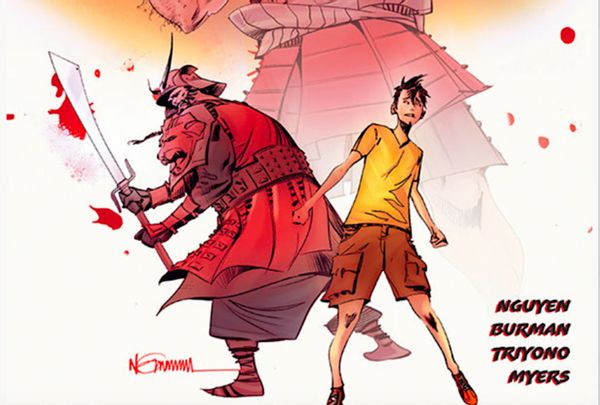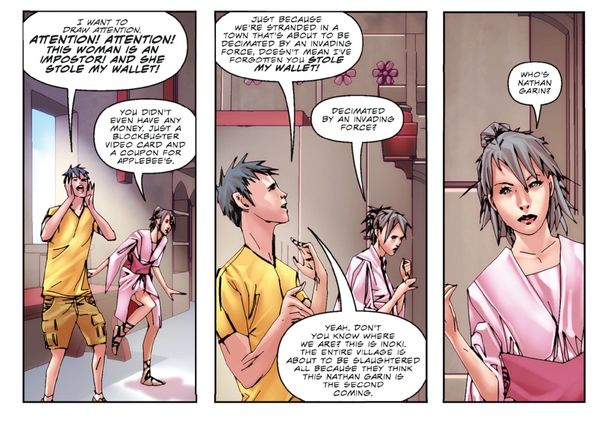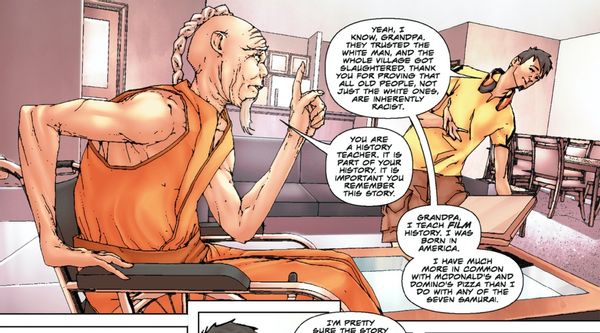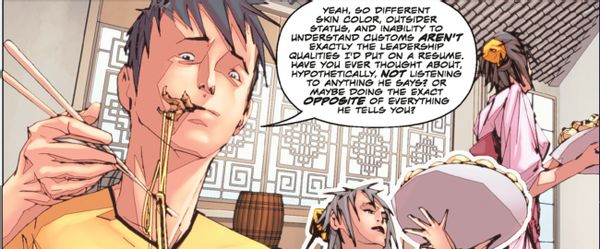Matt Damon and George Takei, check out “White Savior,” a samurai satire challenging beloved movies
We’ve seen the white savior trope, in which a white hero swoops in to save people of color from their misfortunes. But you’ve probably never seen it written like it is in the new Dark Horse comic “White Savior.”
Co-authors Scott Burman and Eric Nguyen, who also illustrated it, spoke with Salon about “White Savior,” which attacks the tired theme with a refreshing humor that flips it on its head and subverts stereotypes. The four-part comic series features 20-something Todd Parker, a film teacher, who claims that despite his Japanese American heritage he has “more in common with McDonald’s and Domino’s Pizza” than with “any of the Seven Samurai.”
“I love Matt Damon. If he wants to be in ‘White Savior,’ sign him up.”
Todd learns about an ancient prophecy from the village of Inoki, that stated an outsider with “snow-colored skin” would save the villagers and lead them through the battle with their rival. But this outsider ends up being an “awful, drunken idiot.” When Todd and his friends, Maggie and Neal, are thrown back in time to feudal Japan, they become responsible for showing the people of Inoki the truth and rescuing them from the impending damage their white savior is going to cause.
Nearly every page of the comic includes a clever joke — like Todd being asked which Japanese clan he’s a part of and answering, “Uh . . . the Wu Tang Clan?”
“I think a lot of times, you hear about stories like this and usually they take a much more serious approach,” said Burman, who likes to joke about being the white guy involved with “White Savior.”
“I think, and who can ever say this about their own thing, but I think with us we were always comedy-first, and that will get the message through a lot better than just heavy handedly pushing this,” he added.
While Nguyen has been working in comics for over 15 years, illustrating for Marvel and DC, Burman didn’t have any previous experience in comics before “White Savior” was picked up.
The pair decided to work together seven years ago, after Burman reached out to Nguyen over email and sent him a script. Burman’s sense of humor sold Nguyen, who was looking for a lighter and funnier project, on working together.
The two sat down, over video call, to talk about the making of “White Savior,” and where it might be going in the future.
 “White Savior” (Dark Horse)You’ve said that you went into this not intending to make a social statement, but just to make something fun and funny. What was it like to realize that it’s being viewed as and ultimately is part of a bigger statement?
“White Savior” (Dark Horse)You’ve said that you went into this not intending to make a social statement, but just to make something fun and funny. What was it like to realize that it’s being viewed as and ultimately is part of a bigger statement?
Eric Nguyen: For me, I thought it was great. We didn’t go into it with a specific notion we’re stating about this whole idea of white savior, white entitlement and all that stuff. We did like the fact that we were poking fun at this whole Hollywood trope. The movie that really got me was not really Tom Cruise’s “The Last Samurai,” but it was Matt Damon’s “The [Great] Wall.”
It was ridiculous. Like I’ve been saying in other interviews, I love Matt Damon. If he wants to be in “White Savior,” sign him up . . . It was kind of just over-the-top for me. So that’s what got us, and when we came up with the title “White Savior,” it just sounded perfect.
Scott Burman: Eric, of the two of us, understandably is pretty fearless. Whereas me, I’m afraid of everything. I’m like, “‘White Savior,’ that’s so funny.” Then a minute later, I’m like, “People are gonna Google my name and they’re gonna see ‘White Savior’ next to it. I’m not sure if this is the best idea.”
“We know people are going to hear the title and they’re going to hate this book.”
It’s a very funny dichotomy between the two of us. But initially, we were like, OK, it’s gonna be really, really funny. And then as we were going into it more and watching the movies and looking up past things . . . We were like, OK, wait a minute, as funny as this is, we know we’re tapping into something here.
We know people are going to hear the title and they’re going to hate this book . . . but our goal was to get people to give this a shot. Take any preconceived notions, put them to the side, and just read a funny and entertaining book.
Nguyen: Not even put them to the side. Come in with your preconceived notions and just enjoy the book. I mean, that’s what I’m hoping. Everyone’s gonna have an idea of what a white savior is, but if we surprise them then that, for me, I think that’s awesome — if they enjoy the comedy, enjoy the book.
And we don’t just stop at just poking fun at the white savior. We push other ideas, other stereotypes that I like to make fun of as well. I mean, I’m Asian. The whole idea of chopsticks and the utility of chopsticks was something that always comes up . . . I like poking fun at that stuff.
Burman: When I do it, the message doesn’t come across the same way for some reason. I can’t figure out why.
Nguyen: We also play with the ideas of different people with different strengths, like Maggie is actually our enforcer, and she’s actually the crazy one of the trio. She’ll do things that undoubtedly will surprise people. Maggie is not not your typical girl.
 “White Savior” (Dark Horse)I love the part that you put in where she said, “Can we please not do the whole ‘I’m a girl so I get pink narration boxes’ thing?”
“White Savior” (Dark Horse)I love the part that you put in where she said, “Can we please not do the whole ‘I’m a girl so I get pink narration boxes’ thing?”
Nguyen: Little things like that, I’m glad that people pick it up. We hear so many different little things from others, from different people’s backgrounds, what they pick up and what they find amusing. I enjoy it when I hear people pick up little things like that.
“I will state 100% that the George Takei joke that we have in the book has an ulterior motive.”
I did want to talk about your characters a little bit. Todd Parker makes a joke about assimilation and how he has “the whitest name ever.” How was that kind of joke, that part of his character, influenced by your own experiences?
Nguyen: I totally relate to Todd Parker. When we came over here — I’m from Vietnam, I came over in 1975 — we did the assimilation thing. We lived in Texas, and initially my parents had us speak only English. We were going to a majority white school and all that stuff.
I actually do have a similar mindset as Todd Parker. I’m just an average person, I just happen to be Asian American. I don’t really define myself as my culture. I’m Asian American — I’m no more, no less American than anyone else.
Was there a reason why you decided to not make your main character Vietnamese and to set the story in Japan?
Nguyen: That’s actually on Scott.
Burman: When Eric and I started this, we didn’t have a publisher. We had no idea if this would get picked up, we had no idea if we could sell it, we had no idea of anything. We came up with the idea and we started writing, and Eric started drawing some of it. And then he got a job, I think “Wolverine” for Marvel. And Marvel was paying him a lot more than me, which was nothing. So he took that job, and we had to take a little time off.
In the meantime, I got an idea. I said, let’s take the script and let’s email it to famous people. Let’s email it to famous Asian Americans and maybe we’ll be able to use their likeness in the book and sell the book that way. Basically, if you were an Asian American celebrity, you got an email from myself or Eric.
We had one person, and I don’t want to say their name, who was on board with it. And then that person fell off a bit, and we’d already done a lot. That’s why we made it Japanese. It seems weird in hindsight, that Eric’s Vietnamese and we made [Todd] Japanese, but it’s because we thought we’d be able to get a better deal with the celebrity we had on board.
Nguyen: It also turned out to be perfect anyway, because Japanese culture, their ideology and their principles are so strong. I just thought it made perfect sense anyway, the Japanese and how they see themselves, it [lent] itself to how they can believe in this white savior prophecy.
Can you talk a little bit more about the inspiration behind some of the other characters like Maggie, Neal or any of the other characters?
Nguyen: There’s not just one person that’s really the protagonist, it’s all three of them . . . It’s actually Scott who does a lot of the scripting, where they do a lot of back-and-forth interaction. I think that a lot of us, with our friends, do that all the time. We throw out random subject matter and sass each other while we’re doing something, and I thought that was great. We wanted that sort of relationship from these three.
So, it’s not really we wanted a specific inspiration for this person, then a specific inspiration for another. They just turned out to be that way because of their dynamic with each other. Like how Maggie and Neal are always sassing Todd about being, you know, he’s definitely not masculine . . . He talks about a lot of random stuff, but he can’t really do much.
Burman: When we originally wrote this, it was double the length. We had in mind eight issues. And when we were talking to Dark Horse, they said they typically do four issues . . . Dark Horse was phenomenal, and they would have let us do anything, but we just thought we could maybe condense this into four. And in some ways, it made it stronger.
Because of that, though, the only thing that I would have done is have a little bit more of Neal, Todd’s best friend. Probably my favorite joke of the entire book is in the third issue — I might spoil it but it shouldn’t matter too much. But Neal comes back in the story, and we have an editor’s note about how to check out what happened with Neal: “Be sure to read our special one issue story of Neal.” Then, underneath that note, there’s another note that says, “Hi, I’m the real editor of this book. Eric and Scott have been writing their own editor’s notes. We told them there’s not going to be any one shot until we see the sales of this one.” And it’s my absolute favorite thing in the book.
Nguyen: We do give this little hint that we do have a “Dark Savior” story. And that’s Neal. I would love to do that “Dark Savior” story.
How did you split up the work and what was your work dynamic and the writing process like?
Nguyen: I got the short end of the stick. I had to draw this whole damn thing.
Burman: We thought it up together and then Eric and I just plotted it out. I probably was more on the structure of it when we were plotting it out, and I would literally say to Eric, “Well, what do you want to draw? What do you want to put in this? What do you want to do?” And I would take all the points that we had and I’d put them into a basic script. And then we’d sit down, and we’d expand on it.
We’d create the jokes together, go back and forth . . . Eric would draw it, and he would tell me some ideas he had when drawing it, and then we’d come together and throw the jokes on the page, essentially.
 “White Savior” (Dark Horse)
“White Savior” (Dark Horse)
There are so many good jokes with pop culture references, including to the Wu Tang Clan and George Takei. What makes those references important to the story?
Nguyen: That’s all Scott right there. He likes to throw in nuggets for the future. Once we blow up, it’ll all make sense.
Burman: There’s a lot of different, very weird, random references in this, and I think that’s part of my writing style. But also, some of them do have ulterior motives. I will state 100% that the George Takei joke that we have in the book has an ulterior motive. Not only is it a joke, but also, we’re waving the flag to George Takei saying, “You need to read this book. You need to get in the movie.”
Speaking of that, you’ve made some comments about making a movie or pitching it to Netflix. What would your ideal cast look like?
Nguyen: Initially, we started throwing out names for casting. But now, since we’re actually talking with people who may have the ability to take this into let’s say Netflix or a film —
Burman: It’s tricky because, now that we’re talking to these people, we don’t want to say other people’s names. We don’t know what the heck we’re doing, we’re trying to figure out what the right or wrong thing to say is. Eric, help me out.
Nguyen: We’re getting so much support from the Asian community. We’ve talked to people who are actors in Netflix, we’ve talked to people who have produced shows for Netflix, we’re talking to people who have produced comedies for ABC. I think we’re on the right track. We just need to let them take charge, and whoever they think will make the best adaptation for this, we’re on board with that. I only know how to draw, and my world is comics. Let the smart people take over and do what they need to do to make this thing.
 “White Savior” (Dark Horse)What has it been like to see so much support from the Asian community and the Asian community in the industry?
“White Savior” (Dark Horse)What has it been like to see so much support from the Asian community and the Asian community in the industry?
Nguyen: I never thought I would be anywhere in close proximity to actors and these influencers and stuff. Scott just had a great meeting with someone who’s pretty well-known at Netflix, doing the shows there. And I’m surprised he didn’t get a picture with those people, because that would have been my first thing on Instagram.
Burman: Well, for the record I gave them the comic, and the idea is let them take a picture with the comic. I’m not important, the comic is important. The white guy in “White Savior” is gonna step to the side in this one. But it’s been interesting. For me, it’s really funny. We went on the “They Call Us Bruce” podcast. What’s really funny is that they’ve had some of the biggest Asian American names ever on their podcast. They’ve had 188 episodes, me and Eric were on their 189th episode, and I was the first-ever white guy [guest]. We made a joke about that.
“George Takei — can we send you a copy? … We want to make sure you play the grandpa in the movie.”
This is my first thing that I’m ever getting out there to the world, and so it’s been really nice to hear people enjoying the comedy that I’ve done. But also, it has been extremely nice, with the Asian American community, to know that we’re doing more than just telling jokes, that we’re sending this message out. In my case, I’m a supporter and Eric’s much more the face, I would say.
Nguyen: The support has been amazing, especially from the Asian community.
Want a daily wrap-up of all the news and commentary Salon has to offer? Subscribe to our morning newsletter, Crash Course.
What would you want the future of “White Savior” to look like? Are you thinking about continuing the comic or pursuing other opportunities?
Nguyen: Definitely, we want this out there in other forms, other than comics. I definitely see it on TV or on film. That would make my day . . . But we do have other stories, we do have other ideas coming up that we’re excited about. We do have some pitches from Marvel and DC, and so we’re working on those things right now.
Burman: And I still think Eric is crazy, because for some odd reason, he wants to stick with me. He was like, “Let’s pitch to Marvel and DC together!” And I’m like, “Yeah!” We have, basically, a smorgasbord of ideas. We just want to make sure the next one is going to be the right one
Eric’s been drawing up a storm, so we’ve got stuff [ready] to go and we’ve got both sequels and spin-offs. We think it could also lend itself to other, non-Asian creators — Indian American, African American, Native American — and it can spin off and tell their stories, their versions of “The Last Samurai,” if you will. There’s a lot of different ways we can go, and we’re just excited at the opportunities that will present themselves.
Is there anything else that either of you would like to add about “White Savior” or anything else you’ve got coming up?
Burman: George Takei — can we send you a copy? You can write that in capital letters. George, we want to send you a copy, let’s get moving on this thing. We want to make sure you play the grandpa in the movie. That’s the only casting we can say 100% George Takei, grandpa. I don’t think there’s any substitutes.
Read more
about white saviors in media

